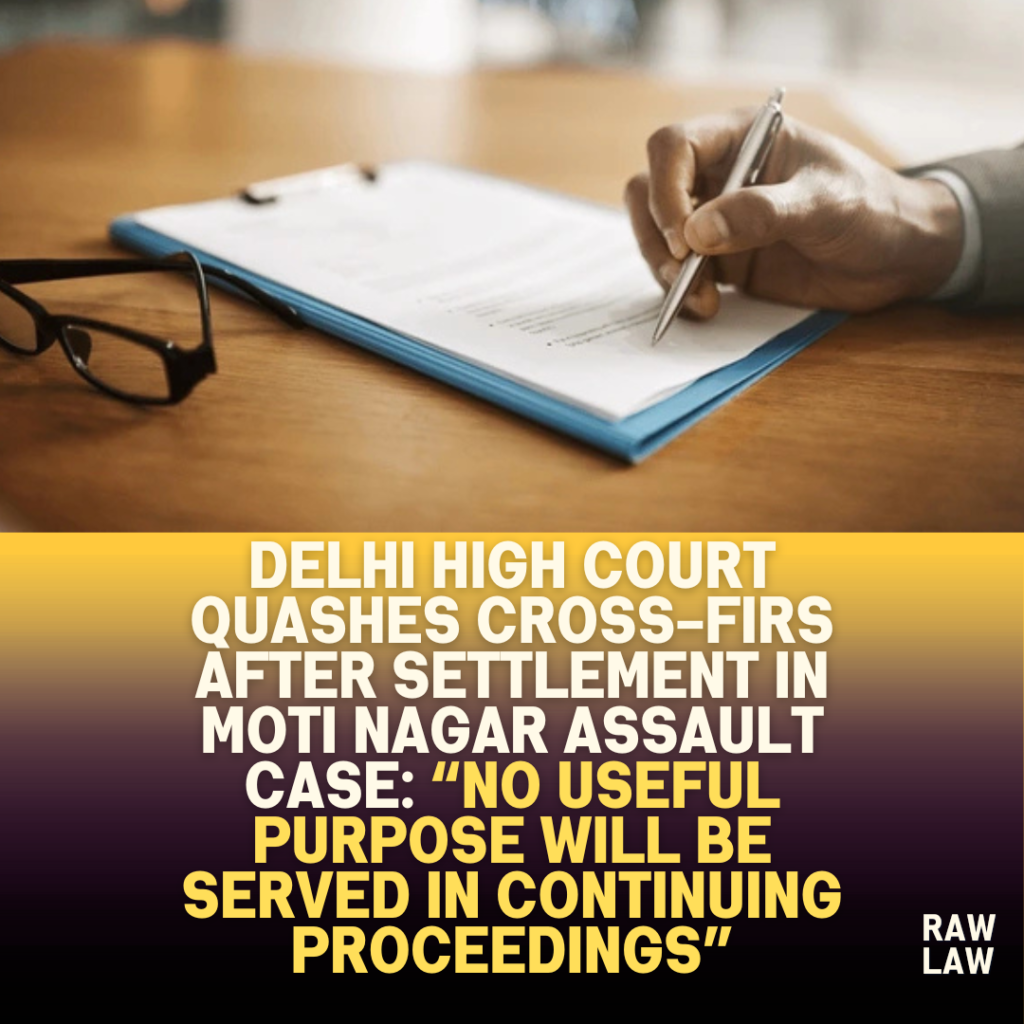Court’s Decision
The Delhi High Court quashed an FIR registered under Sections 118(1)/3(5) of the Bharatiya Nagarik Suraksha Sanhita (BNSS) after noting that both parties to a violent dispute had amicably settled their differences. The Court held that in light of the settlement and in the interest of justice, continuation of the criminal proceedings would serve no useful purpose and would amount to an abuse of process.
Facts
The case arose from an incident on 5 March 2025, when a dispute over outstanding payments allegedly escalated into a physical altercation at the shop of one of the petitioners in Moti Nagar, Delhi. The complainant, along with his son and a friend, claimed they were attacked with a sharp-edged weapon, sustaining stab injuries. This led to the registration of FIR against the petitioners.
A cross-FIR was also lodged the same day by one of the petitioners against the complainant, alleging offences under Sections 115(2)/126(2)/3(5) of the BNS. Both cases stemmed from the same incident.
During the pendency of proceedings, the parties executed a Memorandum of Understanding (MoU) on 5 July 2025, agreeing to mutually withdraw all claims and seek quashing of both FIRs.
Issues
- Whether the High Court could exercise its powers under Article 226 of the Constitution and Section 528 of the BNS to quash criminal proceedings based on a compromise between the parties.
- Whether the nature of the offences and circumstances of the case justified such quashing.
Petitioners’ Arguments
The petitioners argued that:
- The dispute was private in nature and arose from a business transaction, with no impact on public interest.
- Both parties had amicably settled the matter voluntarily, without coercion.
- Continuing with the proceedings would be a futile exercise and would unnecessarily burden the criminal justice system.
- The cross-FIR filed against the complainant also formed part of the settlement, ensuring complete closure of the dispute.
Respondents’ Arguments
The complainant and the other injured parties, present in court, confirmed that:
- The matter had been resolved amicably.
- The settlement was voluntary and without any pressure, fear, or inducement.
- They had no objection to the quashing of the FIR against the petitioners.
The Additional Public Prosecutor representing the State also raised no objection to the quashing, citing the mutual agreement.
Analysis of the Law
The Court examined the scope of its powers under Article 226 of the Constitution and Section 528 of the BNS, noting that it could quash proceedings where continuing them would be unjust, oppressive, or an abuse of process, especially in cases involving private disputes.
Precedent Analysis
The Court relied on the Supreme Court’s decision in Gian Singh v. State of Punjab (2012) 10 SCC 303, which held that High Courts could quash criminal proceedings involving non-compoundable offences if:
- The dispute was primarily private or personal in nature.
- Continuing proceedings would be unfair or contrary to the interest of justice.
- Quashing was necessary to secure the ends of justice.
Court’s Reasoning
Justice Ravinder Dudeja observed that:
- The settlement agreement was genuine and voluntary.
- The injured parties had categorically stated their lack of objection to the FIR being quashed.
- In such circumstances, continuing the prosecution would serve no meaningful purpose and would amount to unnecessary harassment.
The Court emphasised that the principles in Gian Singh applied squarely, as the dispute was personal, the settlement was comprehensive, and public interest would not be adversely affected by quashing.
Conclusion
The Court allowed the petition, quashing FIR and all consequential proceedings. The pending applications were also disposed of.
Implications
This ruling reiterates that:
- In private disputes where parties settle amicably, the High Court can quash proceedings even for certain non-compoundable offences.
- The decision reinforces judicial recognition of compromise as a legitimate means to resolve conflicts and reduce the burden on the criminal justice system.
- It clarifies that the key considerations are voluntariness, genuineness, and absence of adverse impact on public interest.
FAQs
Q1. Can criminal cases be quashed on the basis of a settlement?
Yes. The High Court can quash proceedings if the dispute is private, the settlement is voluntary, and continuation would be an abuse of process, as clarified in Gian Singh v. State of Punjab.
Q2. Does this apply to all offences?
No. While private disputes may be quashed, serious offences affecting public interest, such as heinous crimes, generally cannot be quashed even if parties settle.
Q3. What was unique in this case?
Both FIRs arising from the same incident were settled through an MoU, with all parties confirming the compromise before the court, and the State raising no objection.



